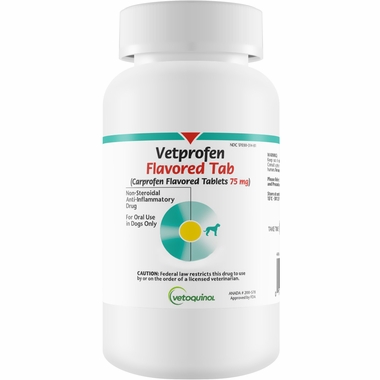View Vetprofen Flavored Tabs Drug Facts Sheet.
Always provide Client Information Sheet with prescription. Carefully consider the potential benefits and risk of Vetprofen Flavored Tab and other treatment options before deciding to use Vetprofen Flavored Tab. Use the lowest effective dose for the shortest duration consistent with individual response. The recommended dosage for oral administration to dogs is 2 mg/lb (4.4 mg/kg) of body weight daily. The total daily dose may be administered as 2 mg/lb of body weight once daily or divided and administered as 1 mg/lb (2.2 mg/kg) twice daily. For the control of postoperative pain, administer approximately 2 hours before the procedure. Tablets are scored and dosage should be calculated in half-tablet increments.
Indications:
Vetprofen Flavored Tab is indicated for the relief of pain and inflammation associated with osteoarthritis and for the control of postoperative pain associated with soft tissue and orthopedic surgeries in dogs.
Contraindications:
Vetprofen Flavored Tab should not be used in dogs exhibiting previous hypersensitivity to carprofen.
Warnings:
Keep out of reach of children. Not for human use. Consult a physician in cases of accidental ingestion by humans. For use in dogs only. Do not use in cats.
All dogs should undergo a thorough history and physical examination before initiation of NSAID therapy. Appropriate laboratory tests to establish hematological and serum biochemical baseline data prior to, and periodically during, administration of any NSAID should be considered. Owners should be advised to observe for signs of potential drug toxicity (see Information for Dog Owners, Adverse Reactions, Animal Safety and Post-Approval Experience).
Precautions:
As a class, cyclooxygenase inhibitory NSAIDs may be associated with gastrointestinal, renal and hepatic toxicity. Effects may result from decreased prostaglandin production and inhibition of the enzyme cyclooxygenase which is responsible for the formation of prostaglandins from arachidonic acid.11-14 When NSAIDs inhibit prostaglandins that cause inflammation they may also inhibit those prostaglandins which maintain normal homeostatic function. These anti-prostaglandin effects may result in clinically significant disease in patients with underlying or pre-existing disease more often than in healthy patients.12-14 NSAID therapy could unmask occult disease which has previously been undiagnosed due to the absence of apparent clinical signs. Patients with underlying renal disease for example, may experience exacerbation or decompensation of their renal disease while on NSAID therapy.11-14 The use of parenteral fluids during surgery should be considered to reduce the potential risk of renal complications when using NSAIDs perioperatively.
Carprofen is an NSAID, and as with others in that class, adverse reactions may occur with its use. The most frequently reported effects have been gastrointestinal signs. Events involving suspected renal, hematologic, neurologic, dermatologic, and hepatic effects have also been reported. Patients at greatest risk for renal toxicity are those that are dehydrated, on concomitant diuretic therapy, or those with renal, cardiovascular, and/or hepatic dysfunction. Concurrent administration of potentiall nephrotoxic drugs should be approached cautiously, with appropriate monitoring. Concomitant use of Vetprofen Flavored Tab with other anti-inflammatory drugs, such as other NSAIDs or corticosteroids, should be avoided because of the potential increase of adverse reactions, including gastrointestinal ulcerations and/or perforations. Sensitivity to drug-associated adverse reactions varies with the individual patient. Dogs that have experienced adverse reactions from one NSAID may experience adverse reactions from another NSAID. Vetprofen Flavored Tab treatment was not associated with renal toxicity or gastrointestinal ulceration in well controlled safety studies of up to ten times the dose in healthy dogs.
Vetprofen Flavored Tab is not recommended for use in dogs with bleeding disorders (e.g., Von Willebrand's disease), as safety has not been established in dogs with these disorders. The safe use of Vetprofen Flavored Tab in animals less than 6 weeks of age, pregnant dogs, dogs used for breeding purposes, or in lactating bitches has not been established. Studies to determine the activity of Vetprofen Flavored Tab when administered concomitantly with other protein-bound or similarly metabolized drugs have not been conducted. Drug compatibility should be monitored closely in patients requiring additional therapy. Such drugs commonly used include cardiac, anticonvulsant and behavioral medications. It has been suggested that treatment with carprofen may reduce the level of inhalant anesthetics needed.15
If additional pain medication is warranted after administration of the total daily dose of Vetprofen Flavored Tab, alternative analgesia should be considered. The use of another NSAID is not recommended. Consider appropriate washout times when switching from one NSAID to another or when switching from corticosteroid use to NSAID use.
Effectiveness:
Confirmation of the effectiveness of Vetprofen Flavored Tab for the relief of pain and inflammation associated with osteoarthritis, and for the control of postoperative pain associated with soft tissue and orthopedic surgeries was demonstrated in 5 placebo-controlled, masked studies examining the antiinflammatory and analgesic effectiveness of Vetprofen Flavored Tab in various breeds of dogs.
Separate placebo-controlled, masked, multicenter field studies confirmed the anti-inflammatory and analgesic effectiveness of Vetprofen Flavored Tab when dosed at 2 mg/lb once daily or when divided and administered at 1 mg/lb twice daily. In these two field studies, dogs diagnosed with osteoarthritis showed statistically significant overall improvement based on lameness evaluations by the veterinarian and owner observations when administered Vetprofen Flavored Tab at labeled doses.
Separate placebo-controlled, masked, multicenter field studies confirmed the effectiveness of Vetprofen Flavored Tab for the control of postoperative pain when dosed at 2 mg/lb once daily in various breeds of dogs. In these studies, dogs presented for ovariohysterectomy, cruciate repair and aural surgeries were administered Vetprofen Flavored Tab preoperatively and for a maximum of 3 days (soft tissue) or 4 days (orthopedic) postoperatively. In general, dogs administered Vetprofen Flavored Tab showed statistically significant improvement in pain scores compared to controls.
Animal Safety:
Laboratory studies in unanesthetized dogs and clinical field studies have demonstrated that Vetprofen Flavored Tab is well tolerated in dogs after oral administration.
In target animal safety studies, Vetprofen Flavored Tab was administered orally to healthy Beagle dogs at 1, 3, and 5 mg/lb twice daily (1, 3 and 5 times the recommended total daily dose) for 42 consecutive days with no significant adverse reactions. Serum albumin for a single female dog receiving 5 mg/lb twice daily decreased to 2.1 g/dL after 2 weeks of treatment, returned to the pre-treatment value (2.6 g/dL) after 4 weeks of treatment, and was 2.3 g/dL at the final 6-week evaluation. Over the 6-week treatment period, black or bloody stools were observed in 1 dog (1 incident) treated with 1 mg/lb twice daily and in 1 dog (2 incidents) treated with 3 mg/lb twice daily. Redness of the colonic mucosa was observed in 1 male that received 3 mg/lb twice daily.
Two of 8 dogs receiving 10 mg/lb orally twice daily (10 times the recommended total daily dose) for 14 days exhibited hypoalbuminemia. The mean albumin level in the dogs receiving this dose was lower (2.38 g/dL) than each of 2 placebo control groups (2.88 and 2.93 g/dL, respectively). Three incidents of black or bloody stool were observed in 1 dog. Five of 8 dogs exhibited reddened areas of duodenal mucosa on gross pathologic examination. Histologic examination of these areas revealed no evidence of ulceration, but did show minimal congestion of the lamina propria in 2 of the 5 dogs.
In separate safety studies lasting 13 and 52 weeks, respectively, dogs were administered orally up to 11.4 mg/lb/day (5.7 times the recommended total daily dose of 2 mg/lb) of carprofen. In both studies, the drug was well tolerated clinically by all of the animals. No gross or histologic changes were seen in any of the treated animals. In both studies, dogs receiving the highest doses had average increases in serum L-alanine aminotransferase (ALT) of approximately 20 IU.
In the 52 week study, minor dermatologic changes occurred in dogs in each of the treatment groups but not in the control dogs. The changes were described as slight redness or rash and were diagnosed as nonspecific dermatitis. The possibility exists that these mild lesions were treatment related, but no dose relationship was observed.
Clinical field studies were conducted with 549 dogs of different breeds at the recommended oral doses for 14 days (297 dogs were included in a study evaluating 1 mg/lb twice daily and 252 dogs were included in a separate study evaluating 2 mg/lb once daily). In both studies the drug was clinically well tolerated and the incidence of clinical adverse reactions for Vetprofen Flavored Tab-treated animals was no higher than placebo-treated animals (placebo contained inactive ingredients found in Vetprofen Flavored Tab). For animals receiving 1 mg/lb twice daily, the mean post-treatment serum ALT values were 11 IU greater and 9 IU less than pre-treatment values for dogs receiving Vetprofen Flavored Tab and placebo, respectively. Differences were not statistically significant. For animals receiving 2 mg/lb once daily, the mean post-treatment serum ALT values were 4.5 IU greater and 0.9 IU less than pre-treatment values for dogs receiving Vetprofen Flavored Tab and placebo, respectively. In the latter study, 3 Vetprofen Flavored Tab-treated dogs developed a 3-fold or greater increase in (ALT) and/or (AST) during the course of therapy. One placebo-treated dog had a greater than 2-fold increase in ALT. None of these animals showed clinical signs associated with laboratory value changes. Changes in the clinical laboratory values (hematology and clinical chemistry) were not considered clinically significant. The 1 mg/lb twice daily course of therapy was repeated as needed at 2-week intervals in 244 dogs, some for as long as 5 years.
Clinical field studies were conducted in 297 dogs of different breeds undergoing orthopedic or soft tissue surgery. Dogs were administered 2 mg/lb of Vetprofen Flavored Tab two hours prior to surgery then once daily, as needed for 2 days (soft tissue surgery) or 3 days (orthopedic surgery). Vetprofen Flavored Tab was well tolerated when used in conjunction with a variety of anesthetic-related drugs. The type and severity of abnormal health observations in Vetprofen Flavored Tab and placebo-treated animals were approximately equal and few in number (see Adverse Reactions). The most frequent abnormal health observation was vomiting and was observed at approximately the same frequency in Vetprofen Flavored Tab and placebo-treated animals. Changes in clinicopathologic indices of hematopoietic, renal, hepatic, and clotting function were not clinically significant. The mean post-treatment serum ALT values were 7.3 IU and 2.5 IU less than pre-treatment values for dogs receiving Vetprofen Flavored Tab and placebo, respectively. The mean post-treatment AST values were 3.1 IU less for dogs receiving Vetprofen Flavored Tab and 0.2 IU greater for dogs receiving placebo.
Information for Dog Owners:
Vetprofen Flavored Tab, like other drugs of its class, is not free from adverse reactions. Owners should be advised of the potential for adverse reactions and be informed of the clinical signs associated with drug intolerance. Adverse reactions may include decreased appetite, vomiting, diarrhea, dark or tarry stools, increased water consumption, increased urination, pale gums due to anemia, yellowing of gums, skin or white of the eye due to jaundice, lethargy, incoordination, seizure, or behavioral changes. Serious adverse reactions associated with this drug class can occur without warning and in rare situations result in death (see Adverse Reactions). Owners should be advised to discontinue Vetprofen Flavored Tab therapy and contact their veterinarian immediately if signs of intolerance are observed. The vast majority of patients with drug related adverse reactions have recovered when the signs are recognized, the drug is withdrawn, and veterinary care, if appropriate, is initiated. Owners should be advised of the importance of periodic follow up for all dogs during administration of any NSAID.
Adverse Reactions:
During investigational studies of osteoarthritis with twice daily administration of 1 mg/lb, no clinically significant adverse reactions were reported. Some clinical signs were observed during field studies (n=297) which were similar for carprofen and placebo-treated dogs. Incidences of the following were observed in both groups: vomiting (4%), diarrhea (4%), changes in appetite (3%), lethargy (1.4%), behavioral changes (1%), and constipation (0.3%). The product vehicle served as control.
There were no serious adverse events reported during clinical field studies of osteoarthritis with once daily administration of 2 mg/lb. The following categories of abnormal health observations were reported. The product vehicle served as control.
| Percentage of Dogs with Abnormal Health Observations Reportedin Osteoarthritis Field Study (2 mg/lb once daily) |
| Observation |
Carprofen (n=129) |
Placebo (n=132) |
| Inappetence |
1.6 |
1.5 |
| Vomiting |
3.1 |
3.8 |
| Diarrhea/Soft stool |
3.1 |
4.5 |
| Behavior change |
0.8 |
0.8 |
| Dermatitis |
0.8 |
0.8 |
| PU/PD |
0.8 |
--- |
| SAP increase |
7.8 |
8.3 |
| ALT increase |
5.4 |
4.5 |
| AST increase |
2.3 |
0.8 |
| BUN increase |
3.1 |
1.5 |
| Bilirubinuria |
16.3 |
12.2 |
| Ketonuria |
14.7 |
9.1 |
Clinical pathology parameters listed represent reports of increases from pre-treatment values; medical judgment is necessary to determine clinical relevance.
During investigational studies of surgical pain for the tablet formulation, no clinically significant adverse reactions were reported. The product vehicle served as control.
| Percentage of Dogs with Abnormal Health Observations Reportedin Surgical Pain Field Studies with Tablets (2 mg/lb once daily) |
| Observation* |
Carprofen (n=148) |
Placebo (n=149) |
| Inappetence |
1.4 |
0 |
| Vomiting |
10.1 |
13.4 |
| Diarrhea/Soft stool |
6.1 |
6.0 |
| Dermatitis/skin lesion |
2.0 |
1.3 |
| Ocular disease |
2.7 |
0 |
| Dysrhythmia |
0.7 |
0 |
| Apnea |
1.4 |
0 |
| Oral/periodontal disease |
1.4 |
0 |
| Pyrexia |
0.7 |
1.7 |
| Urinary tract disease |
1.4 |
1.3 |
| Wound drainage |
1.4 |
0 |
*A single dog may have experienced more than one occurrence of an event












